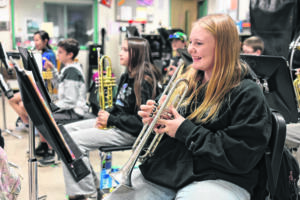The Washougal School District (WSD) administrative office was virtually empty and relatively quiet when the WSD board of directors voted to adopt the district’s 2019-20 budget on Tuesday, Aug. 27.
The scene marked a stark contrast from last year’s budget hearing, which attracted scores of district employees frustrated by a labor dispute that resulted in a teacher strike and delay of the school year.
WSD Superintendent Mary Templeton said the silence spoke to the progress made since then.
“The fact that there wasn’t a lot of attention tonight, I think it says that we’ve been really transparent and good communicators about where we stand and what our challenges are and how we’re going to overcome those,” said Templeton, “and I feel good about that.”
WSD’s $45.8 million 2019-20 budget is the culmination of a months-long process to overcome challenges presented by the “McCleary Fix,” a legislative decision that altered the way K-12 funding is handled in Washington State.
WSD, which was facing a deficit of $1.7 million for the 2019-20 school year, balanced its budget by increasing its local levy, using reserves and “finding efficiencies,” according to Templeton.




